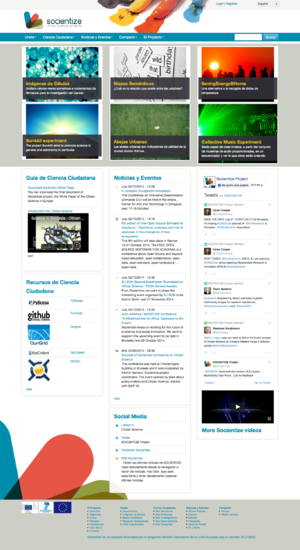Difference between revisions of "Socientize - citizen science projects"
| Line 25: | Line 25: | ||
== <small>'''Description'''</small> == | == <small>'''Description'''</small> == | ||
| − | Socientize | + | Socientize is a citizen science project that promotes the use of outsourced scientific infrastructure including amateur scientists and volunteer researchers that carry out home science projects. Los experimentos participativos que involucran al público incluyen: Música colectiva, Abejas urbanas, Mind Paths, Project Q, Happy Up Energy and home aqua, Mapas Semánticos y Mapas térmicos, entre otros. |
| − | Socientize | + | Socientize started in 2012, in Zaragoza, Spain, and functions as a collaboration among various universities and institutions, including the University of Zaragoza, the Museum of Ciencia-Coimbra, (Portugal), the University of Campina Grande (Brazil), or the Zentrum für Soziale Innovation of Vienna (Austria). |
| − | + | Research groups involved in the project are: Cosnet Lab (Complex Systems and Networks Lab) led by Professor Yamir Moreno, whose role is to investigate the laws that govern the structure and dynamics of complex network systems: phenomena such as epidemic growth, epidemiology, multi-phatogenic diseases, analysis of biological, economic and socio-technical systems, data banks, and theory and experimentation on game dynamics and collective phenomena. In the area of statistics, the group BIFI (Bio-computation and Complex Systems Physics), from the University of Zaragoza, promotes communication between researchers and the industry, to develop together scientific materials, quantum chemistry and new medicines. | |
| − | Socientize | + | Socientize has developed applications such as Sun4All with more than 30,000 images of the sun (spectroheliograms) as a result of 80 years of daily observation of the sun since 1926. Una tercera denominada Cell Spotting para el análisis celular y Mind Paths para la investigación sobre la relación entre las palabras. |
| − | + | The support measures are carried out through the constant updating of educational and research programmes and assessment criteria. Citizens are also included in the decision making, and also promote an open data policy. | |
== <small>'''Interview'''</small> == | == <small>'''Interview'''</small> == | ||
Revision as of 23:02, 10 June 2017
Self-portrait
La ciencia ciudadana es un concepto innovador para involucrar al público en general en los procesos científicos. Una de las mejores maneras de ayudar a la gente a entender la ciencia al permitirles participar en investigaciones y experimentos científicos. Ésto es lo que la ciencia ciudadana trata de lograr.
El proyecto SOCIENTIZE coordinará todos los agentes implicados en el proceso de la ciencia ciudadana, sentando las bases para este nuevo paradigma de la ciencia abierta. El proyecto promoverá el uso de las infraestructuras científicas compuestas de recursos dedicados y externos, incluyendo científicos profesionales y aficionados. SOCIENTIZE pondrá en marcha una red en la que los proveedores de infraestructuras y los investigadores reclutarán voluntarios de un público general para llevar a cabo la ciencia en el país.
Los ciudadanos contribuirán a los estudios científicos con sus propios conocimientos y recursos participando de una forma activa. Los ciudadanos podrán ser donantes mediante la conexión de sus recursos informáticos propios, tales como teléfonos inteligentes, ordenadores u otros dispositivos para la infraestructura científica. Sin embargo, los ciudadanos también serán claves cuando participen activamente en el proceso científico, en fases diferentes: desde actividades pequeñas y sencillas a la creación de nuevas líneas de investigación, llevando a la gente impulsada por la evolución o en el desarrollo de componentes de software, similar a abrir-fuente comunidades. Nos proponemos abrir e-ciencia a la gente, incluso teniendo en cuenta los conocimientos y el tiempo de los ciudadanos científicos como parte de los recursos que constituyen las infraestructuras electrónicas, y llamar a este ciudadano una mayor infraestructura basada en "c-infraestructura”.
Nombre completo del projecto: Society as e-Infrastructure through technology, innovation and creativity Acrónimo del proyecto: SOCIENTIZE Contrato n°: RI-312902 Tipo de proyecto: CSA-SA Fecha de inicio: 1/10/2012 Duración: 24 Meses Presupuesto total: 709.999,86€ Financiado bajo la EC: 709.999,86€ Esfuerzo total financiado en persona por mes: 149 Sitio web: www.socientize.eu Palabras clave: Ciencia Ciudadana científica comunicación Creatividad tecnología de Inteligencia Colectiva e-infraestructuras
(http://socientize.eu/?q=es/content/socientize)
Description
Socientize is a citizen science project that promotes the use of outsourced scientific infrastructure including amateur scientists and volunteer researchers that carry out home science projects. Los experimentos participativos que involucran al público incluyen: Música colectiva, Abejas urbanas, Mind Paths, Project Q, Happy Up Energy and home aqua, Mapas Semánticos y Mapas térmicos, entre otros.
Socientize started in 2012, in Zaragoza, Spain, and functions as a collaboration among various universities and institutions, including the University of Zaragoza, the Museum of Ciencia-Coimbra, (Portugal), the University of Campina Grande (Brazil), or the Zentrum für Soziale Innovation of Vienna (Austria).
Research groups involved in the project are: Cosnet Lab (Complex Systems and Networks Lab) led by Professor Yamir Moreno, whose role is to investigate the laws that govern the structure and dynamics of complex network systems: phenomena such as epidemic growth, epidemiology, multi-phatogenic diseases, analysis of biological, economic and socio-technical systems, data banks, and theory and experimentation on game dynamics and collective phenomena. In the area of statistics, the group BIFI (Bio-computation and Complex Systems Physics), from the University of Zaragoza, promotes communication between researchers and the industry, to develop together scientific materials, quantum chemistry and new medicines.
Socientize has developed applications such as Sun4All with more than 30,000 images of the sun (spectroheliograms) as a result of 80 years of daily observation of the sun since 1926. Una tercera denominada Cell Spotting para el análisis celular y Mind Paths para la investigación sobre la relación entre las palabras.
The support measures are carried out through the constant updating of educational and research programmes and assessment criteria. Citizens are also included in the decision making, and also promote an open data policy.
Interview
Francisco Sanz http://dpya.org/en/index.php/Francisco_Sanz
Publications
Socientize (2013) Green Paper on Citizen Science
Links
URL: http://www.socientize.eu/?q=es
Wayback Machine: https://web.archive.org/web/*/http://www.socientize.eu/?q=es
